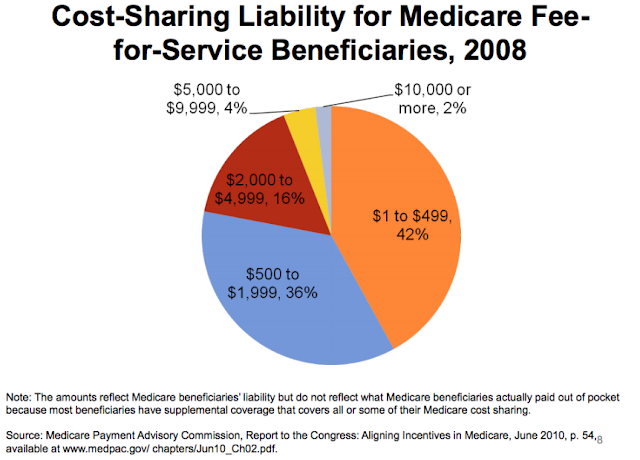Choosing The Right Medicare Supplement Plan G Or Plan F
For a great many people turning 65, A Medicare Supplement Plan G will obviously offer the best insurance coverage value today. In any case, there are changes in the connection between Medicare supplement Plan G and Medicare supplement Plan F and Medicare supplement Plan N that you ought to know about before you settle on a Medicare supplement plan. In this article, I will demonstrate and show you these changes and we will examine how they may affect your basic decision making as you plan to choose if Medicare supplement Plan G (Otherwise known as a Medigap Plan) is appropriate for you. What's more, I will also discuss the contrasts between the two most common Medicare supplement Plans today; the Medicare Supplement Plan G and the Medicare Supplement Plan N. In addition we will cover a basic method you can use to evaluate which senior healthcare plan is ideal for you.
As we talk more about Medicare supplement plans you might be asking; what is the distinction between a Medigap plan and a Medicare supplement? The appropriate response – is nothing. You may have seen that every so often I allude to these plans as Medigap rather than Medicare supplement. The two terms are the same. They both allude to plans that supplement Medicare Part A and Medicare Part B by filling in the holes; the deductibles and copays are your responsibility if you dont have a supplement.
Additionally, you must understand that Medicare supplement plans are guaranteed renewable, this implies that once you have a Medicare supplement, no one but you can cancel the arrangement. Regardless of your health, your arrangement can't be cancelled or your rate changed in light of your current health status. The insurance coverage will be enforced unless you cancel it out.
Find The Right Medicare Supplement Plan G Benefit For You
Medicare supplement Plan G is rapidly turning into the most prominent Medicare supplement in the nation. This is for two reasons – first; on the grounds that the already famous plans, Medicare Supplement Plan F and Plan C are being eliminated as of January 2020. Second, Medicare supplement Plan G is typically a much lower premium AND a much better value.The majority of people looking for a Medigap Plan today discover Medicare supplement Plan G as their best choice. We should quickly investigate the Medicare supplement plans so you can see if for any reason why:
For instance; Medicare supplement Plan F indicates 100% complete coverage. That implies that Medicare supplement plan F will cover 100% of all your copays and deductibles that you would typically need to pay with Medicare Part A (inpatient hospital services) and Medicare Part B (outpatient coverage) insurance plan. It's a fantastic plan and would be a simple choice for some, individuals enrolling in Medicare, with the exception that it is being eliminated in January 2020 and Medicare supplement Plan G as a rule offers equal benefits for less pay. Now lets take a look.
Medicare supplement Plan G has all similar advantages with the exception of the Medicare Part B deductible. That is a yearly deductible. It resets each January 01. It can change each year. In 2018 it's simply $183. We anticipate that it will raise to $250 throughout the following five to seven years. That is it.
All you pay is the yearly Medicare Part B deductible and your premium. Other than that, Medicare and your Medicare supplement Plan G pays all your Medicare-related costs.
The math here is pretty basic, if Medicare supplement Plan G is $183 less in premiums every year, at that point it would be precisely equivalent to Plan F. You pay the $183 deductible out of pocket, at that point you have all the same advantages from a Medicare supplement Plan F. Be that as it may, Medicare Supplement Plan G is typically $300 to $400 per year less in premiums than a typical Medicare supplement Plan F. That implies you can pay the $183 Medicare Part B deductible out of pocket and have cash left over. This makes it a much better value.
You may ask; what happens when the Medicare Part B deductible raises from $183 to $250 yearly? Would that decrease the value of Medicare supplement Plan G?
The Appropriate Response Is No. Here Is The Reason Why –
At the point when the Medicare Part B deductible increases the Medicare supplement Plan F will pay the higher rate on your behalf. Since insurance agencies won't give up it's profits, Medicare Supplement Quotes the cost or premium for Plan F will increase to make up to for the rise in the Part B deductible. Truth be told, Plan F premiums as a rule increases $1.50 for each $1 increment in the Part B deductible. They add an extra surcharge to pay that deductible for you.
The Medicare supplement Plan G isn't affected at all by cost increases in the Medicare Part B deductible. So YOU don't encounter a similar price increase. You do pay the higher deductible, yet you don't pay the additional surcharge. That by itself saves you hundreds of dollars yearly. That is the reason that Medicare supplement part G is a superior value!
Individuals considering a Medicare supplement Plan G regularly compare the cost and benefits with a Medicare supplement Plan N. Medicare supplement Plan N ordinarily cost much less than a Medicare supplement Plan G, however there is a catch! Actually, Medicare supplement Plan N can cost 25% to 35% less expensive than a Medicare supplement Plan G. Be that as it may, Medicare supplement Plan N has less coverage you should know about. Much the same as with Medicare supplement Plan G, with Medicare supplement Plan N you pay that Medicare Part B deductible out of pocket. You will likewise pay a little co-pay of up to $20 when you see a specialist, $50 for emergency room visits.
The Medicare supplement will change as of January 01, 2020. You ought to have this especially if you are new Medicare on the grounds that the new table will represent your benefit alternatives for the time you will be on Medicare. Medicare is presenting another Medigap plan. I will demonstrate to you where and how toward the ending of this article.
Medicare supplement Plan F and Medigap Plan C are the most well known plans generally. Medicare supplement Plan G and Medicare supplement Plan N are turning into the most common plans at this time. When Medicare supplement Plan F and Medigap Plan C are never again offered to individuals new to Medicare, everybody in those two plans will getting older and will be requiring more medical services.
This will imply a higher costs for insurance agencies that will go along to Medicare supplement Plan F and Medigap Plan C policyholders with much higher cost increases. In any case, that isn't the main reason Medicare supplement Plan F has a higher price increase than Medicare supplement Plan G! Also there is… .
Plan F was the most common plan with individuals new to Medicare AND, as you probably are aware when you are new to Medicare Part B the insurance agency can't pass judgment on you by your health history. They can't ask a medical inquiry. They have to accept you regardless. That implies they take on more individuals with poor health and higher medical expenses and need to pass those higher expenses to everybody in the coverage plan through much higher premiums.
Here Is The Main Reason This Is Affecting Medicare Supplement Plan G!
It used to be that most individuals with a Medicare supplement Plan G had obtained the coverage later on in Medicare, in their young 70s when they were no longer in their Medicare open enrollment period. That would mean they needed to experience medical underwriting where the insurance agency only accept individuals with better health. By sifting through the general population that would drive up costs, Medicare supplement Plan G had built up a notoriety for being a Plan with low cost increases. A 0% to 3% price increase was the standard.
However, now that has all changed, and this is essential. Presently the general population purchasing Medicare supplement Plan G are for the most part individuals new to Medicare and in their underlying enrollment period. The insurance agencies need to accept them with little to no emphasis to their health condition. This is a major ordeal. It is changing the value flow of Medicare supplement Plan G in a way that you have to seriously consider.
Here is the dark mystery: insurance agencies have a method for raising costs with the goal that the rate increment does NOT appear on our quote tools on price history. This is fundamentally essential for you if you are exploring plans, which I expect you are if your reading this.
This is the thing that insurance agencies do: when they raise costs they have the decision of raising costs for new business, the individuals who have not yet acquired a coverage plan with that agency. Or on the other hand raise the cost on existing business, just those that have an existing policy. Or on the other hand raise costs on both.
On the off chance that the cost increase is on "In-force business only", that is just for the individuals who currently have a policy, it doesn't appear on the cost increase history on our quote tool. It has no effect on individuals taking a look at our agency for the first time. Quote engines just show price increases (and reductions) on New Business.
This delineation is a cost increment that happened not long ago in 2017. Be that as it may, when I pull up a cost increment history on any statement machine this organization demonstrates no value changes in North Carolina for 2017. None. All insurance agencies do this now and again. However, a few organizations influence this a workmanship to shape. Be cautious.
Presently, I realize that was is somewhat off subject. I apologize. In any case, it fits in perfect with the idea of finding the best coverage value. It's not only that this evaluating price data isn't accessible to you. What's more, this is vital; it's that occasionally the policy with the most reduced entry cost is with an organization that raises costs on existing policyholders and burdens existing policyholders with higher expenses while shrewdly keeping the entry price for new individuals enticingly low.
There are insurance agencies that have transformed this tricky trap into an artistic expression! This is the reason it's essential to work with the correct senior health insurance broker who has practical real world experience with Medicare and has worked with these organizations sufficiently long enough to know how they maintain their business.
Back to wrapping up what is going on with Medicare supplement Plan G despite regarding a procedure or procedures to help decide whether Medicare supplement Plan N is ideal for you as opposed to Medicare supplement Plan G.
What we have recently observed is that Medicare supplement Plan G is not any more that sleeper coverage plan with 0% to 3% cost increases. Try not to expect the previous history of low cost increases will proceed continually into what's to come in the near future. Indeed, the cost increments should still be lower than a Medicare Supplement Plan F. Medicare supplement Plan G will still be a superior value than Medicare supplement Plan F.
In any case, in the event that you are retiring on a fixed spending plan and can barley afford the cost of a Medicare supplement Plan G at the present time, the cost could raise to a level you won't be able to manage. You might be in an ideal situation in considering a lower cost Medicare supplement like Medicare supplement Plan N.






















